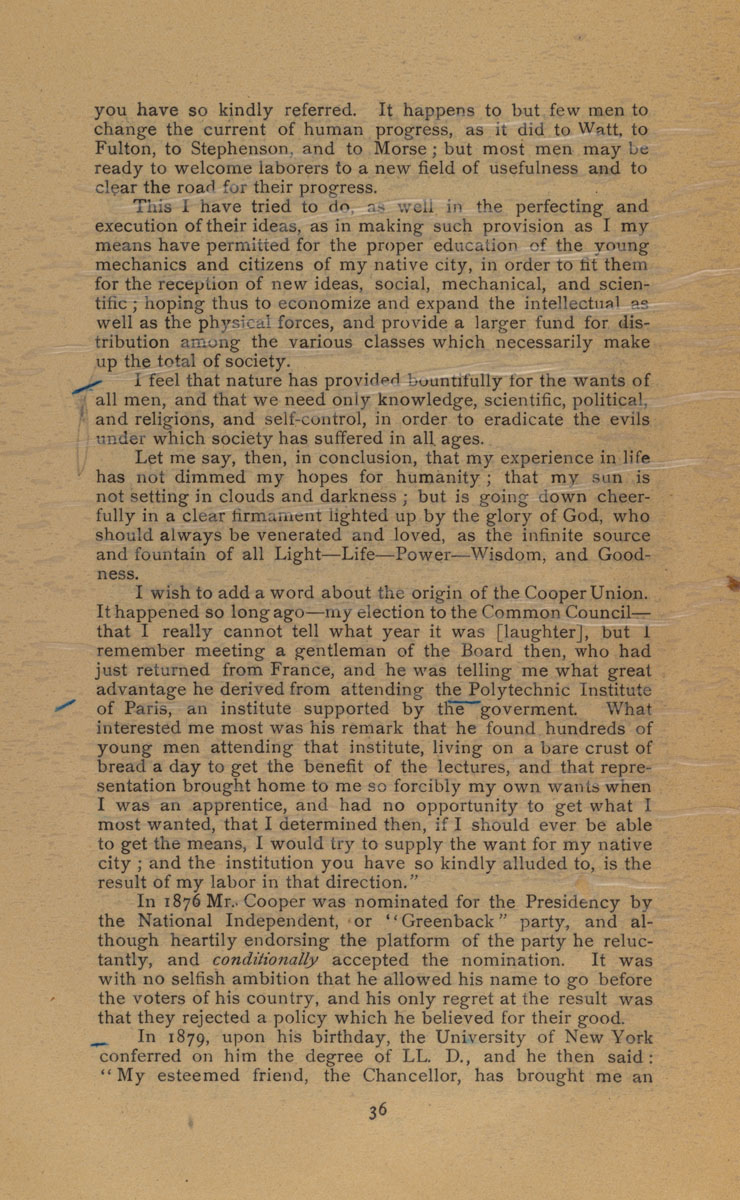you have so kindly referred. It happens to but few men to
change the current of human progress, as it did to Watt, to
Fulton, to Stephenson, and to Morse ; but most men may be
ready to welcome laborers to a new field of usefulness and to
clear the road for their progress.
This 1 have tried to dr^ r.s well in the perfecting and
execution of their ideas, as in making such provision as I my
means have permitted for the proper education of the young
mechanics and citizens of my native city, in order to fit them
for the reception of new ideas, social, mechanical, and scien¬
tific ; hoping thus to economize and expand the intellectual ^s,
well as the physical forces, and provide a larger fund for dis¬
tribution among the various classes which necessarily make
up the total of society.
^ i feel that nature has provided bountitully tor the wants of
all men, and that we need only knowledge, scientific, political,
and religions, and self-control, in order to eradicate the evils
under which society has suffered in all ages.
Let me say, then, in conclusion, that my experience in life
has not dimmed my hopes for humanity ; that my sun is
not setting in clouds and darkness ; but is going down cheer¬
fully in a clear firmaiiient lighted up by the glory of God, who
should always be venerated and loved, as the infinite source
and fountain of all Light—Life—Power—Wisdom, and Good¬
ness.
I wish to add a word about the origin of the Cooper Union.
It happened so long ago—my election to the Common Council—
that I really cannot tell what year it was [laughter], but i
remember meeting a gentleman of the Board then, who had
just returned from France, and he w^as telling me what great
advantage he derived from attending the Polytechnic Institute
of Paris, an institute supported by tfie goverment. What
interested me most was his remark that he found hundreds of
young men attending that institute, living on a bare crust of
bread a day to get the benefit of the lectures, and that repre¬
sentation brought home to me so forcibly my own wants when
I was an apprentice, and had no opportunity to get what I
most wanted, that I determined then, if I should ever be able
to get the means, I would try to supply the want for my native
city ; and the institution you have so kindly alluded to, is the
result of my labor in that direction."
In 1876 Mr.. Cooper was nominated for the Presidency by
the National Independent, or "Greenback" party, and al¬
though heartily endorsing the platform of the party he reluc¬
tantly, and conditionally accepted the nomination. It was
with no selfish ambition that he allowed his name to go before
the voters of his country, and his only regret at the result was
that they rejected a policy which he believed for their good.
^^ In 1879, upon his birthday, the University of New York
conferred on him the degree of LL. D., and he then said:
"My esteemed friend, the Chancellor, has brought me an
36
|








